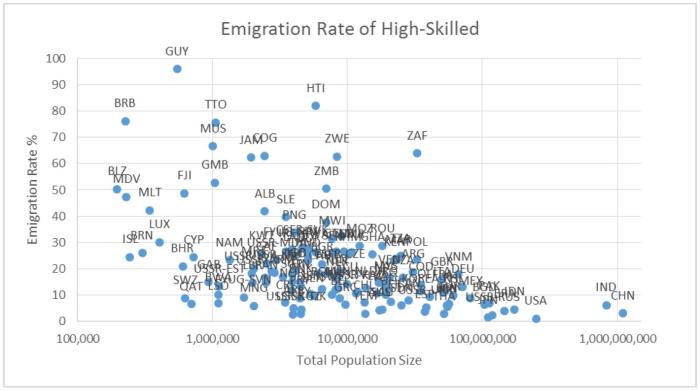Posts Tagged ‘brain drain’
High-skilled migrants matter – and we’re not winning
One of the baffling things in explaining the Industrial Revolution is that education, that pillar most economists believe to be critical for economic growth, seems to have played a relatively minor role. Universal public education was a consequence rather than a cause of the Industrial Revolution. Eighteenth-century England did not first have a skilled population before they had an economic transformation; the uncomfortable truth is that it was the other way round.
This uncomfortable truth does not suggest that formal education was completely unimportant. It suggests, instead, that much of what caused the Industrial Revolution was the scientific knowledge obtained by an elite group of highly skilled artisans, inventors and entrepreneurs. It was not the average level of education of every Brit that mattered. Most of the breakthrough technologies of the era – the Spinning Jenny, the steam engine – came instead from upper-tail tinkerers who had hoped to make a profit from their innovations.
A wonderful new research paper by economists Mara Squicciarini and Nico Voigtländer in the Quarterly Journal of Economics confirm this. They use the subscriber list to the mid-eighteenth century French magazine Encyclopédie to show that knowledge elites mattered in explaining the first Industrial Revolution: in those French towns and cities where subscriber density to the magazine was high, cities grew much faster in the following century, even when controlling for a variety of other things, like wealth and general levels of literacy. Their explanation? Knowledge elites (engineers, scientists, inventors) raise the productivity at the local level through their piecemeal innovations, with large positive spill-overs for everyone around them.
Fast-forward to the twenty-first century. High-skilled workers are the stars of today’s knowledge economy. Their innovations and scientific discoveries spur productivity gains and economic growth. Think, for example, of the immense contributions of Sergey Brin’s Google, or Elon Musk’s Tesla, or even Jan Koum’s WhatsApp. It is for this reason that the mobility of such highly talented individuals has become such an important topic – consider that all three individuals mentioned above are immigrants to the United States. There is little doubt that the most prosperous economies of the future will be the ones to attract the most skilled talent.
Which is why understanding the push-and-pull factors of current global talent flows are so important, and the subject of an important new article in the Journal of Economic Perspectives. The four authors begin with the facts. High-skilled elites are more mobile: between 1990 and 2010, the number of migrants with a tertiary degree increased by 130%; those with only primary education increased by only 40%. More of these high-skilled migrants depart from a broader range of countries and head to a narrower range. While OECD countries constitute less than a fifth of the world’s population, they host two-thirds of high-skilled migrants. 70% of these are located in only four countries: the United States, the United Kingdom, Canada and Australia.
The United States, unsurprisingly, dominates all rankings. Since the 1980s, of all the Nobel Prizes awarded for Physics, Chemistry, Medicine and Economics, academics associated with American institutions have won over 65%, yet only 46% of this group was born in the United States.
One fascinating and underappreciated fact of global migrant flows is the role of highly educated women. Between 1990 and 2010, high-skilled women immigrants to OECD countries increased from 5.7 to 14.4 million; in fact, by 2010, the stock of highly skilled women migrants exceeded male migrants! As the authors note, ‘Africa and Asia experienced the largest growth of high-skilled female emigration, indicating the potential role of gender inequalities and labour market challenges in origin countries as push factors.’
And what about South Africa? The authors calculate the emigration rates of high-skilled individuals by country for 2010, and plot these on a graph. South Africa is a clear outlier: emigration of high-skilled individuals is the sixth highest of the countries included, and by far the highest for countries with more than 10 million people. This is worrisome. True, some of this emigration is made up by high-skilled immigrants from our African neighbours, like Zambia and Zimbabwe, who also have high emigration rates. But the fact remains: our economic outlook will remain precarious if we continue to shed high-skilled individuals at these exorbitant rates.
Is there something to do? The authors mention various push and pull factors that affect the decision to migrate, from gatekeepers that pull the best talent by giving citizenship based on a points system to repressive political systems that suppress freedom of speech and scientific discovery and push the best and brightest to emigrate. If South Africa is to prosper, high-skilled individuals should be recruited and retained – not pushed to find opportunities elsewhere. Protests at universities do not help; providing residency to graduates, as the South African government has proposed, will.
In the knowledge economy, knowledge elites are the bedrock of success. If we are to learn from history, cultivating them should be our number one priority.
*An edited version of this first appeared in Finweek magazine of 3 November.
Twenty years and counting

Trafalgar toyi-toyi: South Africans voting in the 2014 elections. Photos: Cindy Atwell, Michelle Crowther, Marike Groenewald, Ed Kerby and Jonathan Reader.
And so it starts. While those of us lucky enough to be in the homeland will only get the chance to vote next week Wednesday, South Africans living abroad had the opportunity to vote today. And, as I’ve seen from the pictures on my Facebook-feed, it seems the sunshine (I think that is a greyish-blueish sky?) contributed to a festive affair in Trafalgar Square. But it’s not only the 10 000 or so Londoners that voted: I’ve seen pictures of voting stations in Australia, South Korea, Belgium, and even of a couple driving from San Francisco to Los Angeles to cast their vote.
Twenty years after 1994, it’s great to see democracy in action. But the pictures also put into perspective the thousands of South Africans that are working and living abroad. Early this year, Adcorp, a recruitment firm, claimed that more South Africans are returning home than the number of South Africans leaving, reversing the brain drain of skilled professionals that has been a feature of the last few decades. This seemed to suggest that government and private attempts, like the Homecoming Revolution which encourages expats to return home, were successful. Yet a recent study by Thomas Höppli suggests otherwise. Using official immigration and census data from recipient countries, Höppli shows that there are more than 750 000 South Africans living abroad, and that this number is increasing, even if the growth rate has slowed down dramatically. The stock of South Africans living abroad has ‘increased continuously from 2000 to 2010 at an average annual rate of about 5%. Growth subsided from 2010 onwards, averaging a mere 0,6% annually to 2013, but it has not turned negative’.
The brain drain, as the trend is commonly known, is not necessarily bad for the country. South Africans living abroad improve their skills and establish new networks which can often be beneficial for a country in the longer term. Yet the decline in the growth rate of emigration (although not a complete reversal) does suggest that, at least since the recession, South Africa’s relative attractiveness has improved considerably. Many returnees note the relatively high standard of living, good education and (private) health care, and sunny weather as the main pull factors. They should also add the low unemployment level for those with skills.
As a good friend that frequently travels abroad mentioned to me in passing the other day: We have a lot of problems in South Africa, but at least they are our problems. Twenty years after our first democratic elections, I’ll toast to that. Happy voting.

